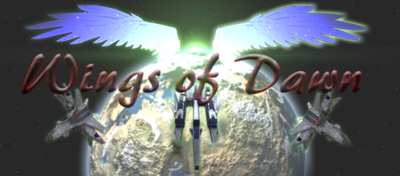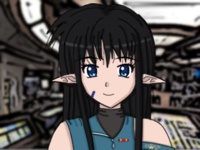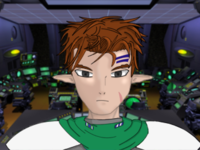Cyrva
| The Wings of Dawn Universe Portal |
|---|

|
The Cyrva are a race of 'space-elves' in the Wings of Dawn universe. Many Cyrvan characters serve as protagonists in the Wings of Dawn universe.
Contents
Physiology
Appearance wise the Cyrva do not differ much from Terrans. The most obvious difference are their 'elven' ears, which almost instantly got them the 'space elves' nickname from the Terrans. On average, Cyrvans have a hearing range between 80hz and 21,700hz.
Cyrvan males on average grow to a height between 160-180cm, Cyrvan females are on average only slightly shorter, 158-176cm. While skin color is almost always white (with the exception of the tanned from Desa) the Cyrva do have a wide range of different hair colors. Compared to a Terran, they are considerably more agile and flexible but have far less physical strength. They also have a far lower pain threshold and will take all possible measures to avoid injury.
Diseases are a rare occurrence and are seldom fatal. The average life span of a Cyrvan can vary greatly, some grow to be over a thousand years old while others 'only' make it to the eight hundred mark, signs of age usually slowly start to show around the age of six hundred. Like Terrans they are omnivores but in general have a preference for plant food.
Occasionally a Cyrvan with large wings of white feathers is born (around one in a billion), why or how this happens remains a mystery. It is possible for a Terran and a Cyrva to have a child together, but in general looked down upon from the Cyrvan side (mostly because Cyrvans tend to have only one partner for life and have a far longer life expectancy than Terrans. However it is actually encouraged on several LTW planets, though there have only been very few examples of this occurring so far.
Culture
There is no known record for any Cyrvan martial arts. While they are excellent natural sharpshooters, the average Cyrvan does not pose much of a threat in hand to hand combat.
The Cyrva have a rich culture filled with song and poetry, a lot of which is inspired by their religion. This religion known as Feryaa, which closely resembles Terran Christianity in many aspects, including the belief that there is one omnipotent God that created the universe. There is a strong taboo on research into DNA-altering genetics, not just because the Cyrva think they are already pretty damned close to perfection, but also because they believe God has not intended for them to mess with his creation on such a deep level.
This is also the reason why the birth of winged ones remain a mystery, as no one is looking into the genetics involved. The birth of a winged one is treated as a good omen for times to come and has been subject of many stories. These 'angels' are often given high-ranking ceremonial positions and are set for life, a life that many Cyrvans dream of. Few Terrans have actually seen a winged one with their own eyes.
Society
The Ten Circles
The Ten Circles of Cyrva for the Protection and Prosperity of Our Kind, often shortened to simply The Ten Circles, is the Cyrvan government and consists of ten circles, with the 10th circle being the largest, with thousands of people in it, and the 1st circle the smallest, with only a handful of elders and high admirals in it.
An example of how the system works - A project, constructing large park in a city on Desa is proposed. The 10th circle will examine, discuss and eventually votes on the project. A majority vote is reached and the project is greenlit. In 90% of the cases this is where it ends.
However, there are cases where someone in the 9th circle is completely opposed to spending resources on this project and he/she can ask for a vote about this project for the 9th circle. This could potentially mean that the 9th circle can veto the project. Which often in turn leads to lobbying to get the 8th circle to take a look at it, and so forth. The 5th circle is a special case as only winged ones are in it.
This becomes increasingly obstructive when it comes to military funding and operations, as a circle consists of both military personnel and civilians. To elaborate on that a bit more: A High Captain in active frontline service is eligible to be in the 8th circle, but is not part of the active decision making until he/she resigns from active service and takes a political military 'deskjob'. This does not apply for Rear Admirals and higher, as they are expected to be able to lead and do paper work at the same time.
Cyrva Star Armada
The Cyrva Star Armada at first glance may seem like an unorganized bunch - superiors are addressed casually by their first name by pilots and crew, while no one is barking orders. On a closer look, it can be noticed that strict discipline simply does not have to be enforced. Pilots do what is asked of them and crew members are always on time at their posts. Cyrva pilot academies do not spend hours on end drilling in routine, but have a complete focus on learning new pilots how to handle their machine and how to improve their odds of survival out on the field.
The CSA has little in terms of ground presence, following a doctrine where orbital control equals having surface control. CSA fleets consists of ships spanning many generations. Older ships are rarely decommissioned, but are occasionally refitted with newer technology. The CSA's Mobile Cyrvan Weapon Systems (MCWS) designs are usually in service for a few hundred years before being replaced by newer designs. Fleet deployments outside CSA space works on a volunteer basis - captains and pilots are under no obligation to follow an outbound fleet. This is not the case however, when defensive fleet action is required.
The CSA can muster about 9,500 capital ships and over 30,000 strikecraft, and has access to highly advanced shipyards in several systems.
History
Early history
The Cyrva originate from the Cyrvadia system, a sun very similar to that of Sol. For several thousand years, the Cyrva were content with just living their lives in peace with little worries. Technology was only advanced/developed when something was deemed too much work and effort. As the Cyrvan population grew, Cyrvan society developed into a unique government system where anyone who wants to be, can be part of the decision making process.
This peaceful existence continued for a long time until one fateful day, disaster struck. A meteor impacted Cyrvadia, killing millions. This brought forth a change, the Cyrva knew they could have prevented this if only they had actually made an effort to develop more technology. The Cyrva then entered a period of time known as 'The First Age of Advancement', in which they created ships for space travel, shielding to protect the ships and weaponry to destroy large asteroids in a single strike.
With these advancements, suddenly Desa (Cyrvadia's sister planet, which had long been a subject in poems and literature) came within reach. Before long, Desa was colonized which opened the eyes of the Cyrva - They could actually travel to other planets now! But why stop there? Let's travel to other stars!
A few hundred years later, the Cyrva had discovered Starlances and they colonized planets in eight star systems. The Cyrva then made first contact with a sentient race, the Yehio in the Erydai system. This race was only just beginning global industrialization. The Cyrva suddenly felt a need to protect and guide the still-young species from themselves and from the possible dangers of the universe. They quickly proceeded to disarm the Yehio and have been guiding them peacefully ever since.
However for the first time in Cyrva history, a internal conflict occurred - not everyone agreed on 'guiding' other species in their development. Usually disagreement is resolved through dialogue, but the views on this subject were just too conflicting. Eventually two clear sides formed - one side that was clearly opposed to helping other races, and the other which felt it was their duty given by God to do so. A ship captain from one of the sides armed with anti-asteroid weaponry, felt so strongly about it that she was willing to shed Cyrvan blood for it, firing on an unarmed vessel carrying people that did not share her opinion. The other side almost immediately responded by storming a building.
From there it escalated into a civil war. The war led to huge leaps in weapon and shielding technology. Whereas the pre-civil war spaceships were only used for transportation and celestial object destruction, the Cyrva were now designing and building actual warships. The civil war lasted for over five years, with the first two years spent mostly figuring out how to fight a war, no less one that spanned multiple star systems. The war would be known as the 'Doctrine War'. Eventually the side that wanted to guide other species emerged victorious. The fleets in the war were unified under a single command, the Cyrva Star Armada (CSA).
The CSA was refined into a highly professional and incredibly well-equipped force over the years. Without immediate need for further expansion and with no direct threats to their safety, the Cyrva once more entered a time in which they just wanted to live their lives in peace. A couple of hundred years passed, little technological advancements were being made and no significant events occurred - until the Cyrva entered the starlance to the Algol system, where the CSA made first contact with the LSF.
Terran-Cyrvan War
During the Terran-Cyrvan War, the Cyrva fared extremely well against the LSF in the beginning, due to their technological superiority and strategy. Starting with their first victory in Algol, then seizing Lyrae quickly, defeating the fierce resistance in both Tauri and Librae, the CSA had managed to fight their way into Harcon and Sol in just a single year. The Cyrva had suspected that the Terrans possessed more star systems, evidently since the CSA hadn't discovered Silva and Phoenicis yet due to the LSF defending Harcon to the bitter end. The Terrans were also churning out new weapon systems rapidly, while managing to build more effective ships. The Terrans did not falter even with thousands of casualties and losses, realizing the Cyrvan fleet received little in terms of reinforcements. The CSA fleets in Sol and Harcon was whittled down slowly to only a total of 457 capital ships, each Cyrvan ship lost boosting the Terran morale.
The Cyrvan public cast their doubts on the war, perhaps they had underestimated the Terrans. Fer'opal, commanding the CSA fleet had realized late that to reach the Terran homeworld, both the Sol and Harcon fleets had to be recombined. The drawback of ordering both fleets to regroup in the Lyrae system, was the Terran interpretation of the re-grouping as a retreat by the CSA, and played their hand accordingly. Swarming out to retake both Tauri and Librae, the LSF converged on Lyrae, putting massive pressure on Fer'opal. Unable to launch a counter attack due to his orders to return to CSA space and let a diplomatic approach be taken, the LSF followed the CSA to the Algol system, where they took orbit of Algol Prime. It was here where the LSF began orbital bombardment of the outpost on the planet. The intensity of the orbital bombardment's result was Algol Prime, utterly ruined - crust cracked in multiple areas, transforming the planet into molten wastelands of lava and brimstone, resembling hell itself.
Almost five years of bloodshed. The Terrans could stand equal with the Cyrvans and fight for themselves. Peace signed, the Algol system declared neutral, left as a monument, a reminder of a long but pointless war and the new name of the system, Abyss.
Tidbits from the "Ask a crew member" Thread
The following tidbits of information below are from characters in the Wings of Dawn universe, so they might contain a personal bias. The links go directly to the post, in which the information was provided.
Biology
• Cyrvan have less tolerance for high g-forces, but their ships possess anti-gravity drives and inertia cancelers. [1] [2]
• Cyrvans are better at handling massive information input than humans. [3]
• Cyrvan couples tend to have between one and three children. [4]
• Due to their long lives, Cyrvans also grow up slower. Most Cyrvans are only fully grown well after the age of 30. Their slow but steady growth also means that they don't have to go through adolescence, unlike Terrans. [5]
• Cyrvan females don't have periods. [6]
• Since no known Cyrvan-Terran hybrid has yet aged beyond 50 years, their life expectancy is unknown. [7]
• Some Cyrvans have the ability to perceive glimpses of the future. While the ability is not exclusive to the "winged ones", roughly 40% of them have this ability to some degree. For some of those gifted individuals, this manifests in the ability to look into the immediate future at will, while others have vague premonitions in their dreams. Past experience has shown that the future is not set in stone and that spontaneous individuals are especially hard to predict. [8]
• While already stated in Cyrvan physiology that Cyrvans generally have better reflexes and flexibility while lacking physical strength even more than their counterparts of the same gender, Daniel "Justice" Hawkings who has personally received a Cyrvan melee strike puts it into perspective: "On average, a Terran trained in hand to hand combat will pretty much always win against a Cyrvan. Cyrvan bodies are featherweight (especially the women) and their attacks have no weight behind them."[9]
Planets and Places
• Cyrvadia is 2.73 times the size of Earth, with roughly 40% of the planet being covered in oceans, and has 0.93Gs. [10][11]
Military Doctrine
• All Cyrvan military assets are bound by law to participate in the defense of Cyrvan space be. This law also applies to non-Cyrvan planets under the protection of the CSA. [12]
• The CSA does not commission terrestrial ships and only possesses minimal ground forces, which mainly consists of MCWSes in Mech form. "The Navy was disbanded many many years ago. Ships have no where to hide and are just sitting ducks when orbital bombardment comes into play. We have yet to see the day in which a hostile force sets foot on one of our planets, so until that day happens our ground forces are very likely to remain as small as they are now." - Commodore Isa'emarl Dertanya [13]
• While it is uncommon, the CSA does not prohibit Terrans to enlist into their ranks. The majority of the Terrans in the CSA are armed security guards on board ships or are stationed planetside. Due to the combination of few Cyrvans willing to and few Terrans being recruited into the CSA, their jobs are well-paid. Terrans are preferred when available for boarding actions, "They are... better at it." - Commodore Isa'emarl Dertanya
Government and Law
• "Members from the 10th up to the 6th circles are elected democratically and serve for a period of 10 years. There are no clear written rules for the upper circles. Sometimes they just elect someone from the 6th circle by majority vote. Sometimes, someone gets in by some extraordinary feat and so forth." - Commodore Isa'emarl Dertanya, the election of members into the Circles [14]
• The Cyrvan government allows immigration of Terrans, but due to strict restrictions and the attitude most Cyrvans have towards Terrans, it happens only rarely. "As far as I know you have to be able to understand and speak the basics of our language so you can get around without the use of a translator. You also need to have a understanding of Cyrvan culture and mannerism. I believe they also screen you on your intelligence and I heard being good looking also helps..." - Lt. Crystal Is'va Dertanya [15][16]
• Despite many Cyrvans not being fully grown by that time, they are considered as adults, once they reach the age of 30 years.[17]
Culture and Society
• During war, sometimes Cyrvans apply a kind of "war paint" to their faces, called Hyalj. Most families have their own design to which some individuals like to add their own personal touch. [18]
• Usually Hyalj are considered little more than adoration, though there are some rare exceptions. [19]
• With some families it represents the role as a warrior or the symbolizes the first kill. [20]
• In Feyraa, the Hyalj have spiritual roots.
• Cyrvan use a unified credit system, name starting with "Ies". Regarded as hard to pronounce for Terrans (or at least for JGASF pilot Misuzu Stella ). Among Terrans it's usually just called Cyrvan Credits (or short CC) and is currently slightly below the Terran UC in value, even after the damage the Terran economy took after the Hertak invasion. [21]
• Cyrvans commonly retire when they are between 700 and 800 years old. [22]
Technology
• MCWSes eject the entire cockpit as a life pod. While the flight helmets vacuum-proof by themselves, in emergencies an energy field can be deployed around the helmet, or even the whole body. [23]
• MCWS flight suit power reserves can sustain a full-body shield for 51 hours, 347 hours for helmet-only shield. [24]
• Currently Cyrvans do not use AI in military applications as far as the Terrans know. [25]


